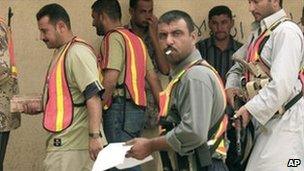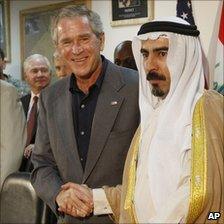Q&A: Iraq's Awakening Councils
- Published

Awakening Council fighters are seen as a key weapon against al-Qaeda
Iraq's Awakening Councils, drawn from among the country's Sunni Muslims, have been seen as a key factor in reducing violence across the country since 2006.
As a US-funded militia, they have been frequently targeted by Sunni insurgents.
The US decision to hand over responsibility for paying their wages to the Shia-dominated Iraqi government in 2009 caused concern among their ranks.
How did they emerge?
Starting in Anbar province, Sunni tribesmen who had previously fought US and Iraqi government forces gradually allied themselves with the US military.
The tribesmen had previously been useful to al-Qaeda in Iraq, external, the most radical Sunni insurgent group, by working with al-Qaeda or allowing it to operate in areas where they predominated in western and central Iraq.
Some Sunni tribesmen who had held positions of privilege under Saddam Hussein saw their influence disappear as Shia Muslims came to dominate politics after the US-led invasion.
Armed opposition to the US by tribesmen was partly based on nationalist sentiment and fear of being governed by Shia politicians.
But the US military succeeded in winning them over by striking deals and bringing thousands on to the US payroll, arming and training them.
The emerging tribal militia became known as the Sahwa, or Awakening Councils. They denied al-Qaeda space to operate from the areas they controlled and drove them out.
Some say the tribes also turned against al-Qaeda because of the indiscriminate killing and the extremity of its ideology.
Others say the initial councils emerged out of competition between tribes for control of trade and smuggling in Anbar province.
The creation of the Awakening Councils had a marked effect on reducing militant violence, in parallel with a cease-fire by Shia militants and the US troop surge.
How do they operate?
More than 100,000 armed Sunnis are members of Awakening Councils, known by the US military as "Concerned Local Citizens' Groups".
Members are meant to receive wages of about $300 a month. Additional costs include arms and training.
The emergence and success of the councils transformed the huge province of Anbar within a year, making it one of most secure parts of Iraq.
Sunni Arab tribes have also formed councils in Salaheddin, Diyala, Nineveh and Tamim provinces.
How vulnerable are they to attack?
Commanders, members and religious leaders associated with the councils have been targeted by militants with increasing frequency in 2010.
On 18 July, dozens of Sahwa members were killed in a suicide bombing as they queued to be paid in the mainly Sunni district of Radwaniya, south-west of Baghdad.

Abu Risha was killed days after meeting President Bush
On 3 April, 25 people were killed, external when gunmen believed to be hunting Sahwa members attacked a village south of Baghdad.
One of the best-known Sahwa leaders in Anbar, Sheikh Abdul Sattar Abu Risha, external, was killed in a bomb attack near his home in September 2007, days after he met visiting US President George W Bush.
Shortly before his death, he set out his reasons for forming an Awakening Council in a TV interview.
"We did not support the US forces or anyone else," he said. "We fought on behalf of our people and defeated al-Qaeda."
Some attacks on Sahwa leaders have also been blamed on long-running blood feuds between families.
How close are they to the Iraqi state?
Late payment of wages is one of the complaints made by members since the US handed over responsibility for paying them to the government in Baghdad.
A Sahwa member wounded in the 18 July attack said they had been waiting to receive two months' worth of pay.
Iraqi officials had talked about disbanding the Councils, which they saw as uncontrolled Sunni militias.
After heavy pressure from the Americans, the government agreed to absorb up to 20% of Sahwa members into the Iraqi security forces, with others to be given government jobs.
But many Sahwa members say they have been given menial jobs.
At the very least, the mainly Shia-run national government is wary of the militias and how they may develop into alternative centres of military and political power.